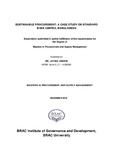| dc.description.abstract | Till today there are no separate rules or regulations for private sector procurement including
banking sector. As such the Public Procurement Act, 2006 is the only established law for
procurement in any sector in Bangladesh. In the Public Procurement Act, 2006 (PPA 2006),
the term ‘procurement’ has been defined as ‘the purchasing or hiring of goods, or
acquisition of goods through purchasing and hiring, and the execution of works and
performance of services by any contractual means’. In line with that banking procurement
can broadly be defined as the purchasing, hiring or obtaining of goods, works or services by
the banking sector by any contractual means. Banking procurement is alternatively
described as the acquisition of goods, works or services if such acquisition is effected with
resources from bank’s funds.
The items involved in banking procurement range from simple goods or services such as
clips or cleaning services to large commercial projects, such as the development of
infrastructure, data centre, banking software etc. Procurement in the banking sector hardly
differs from that in the private sector. The purpose of procurement in the private sector is
basically straightforward whereas that in the public sector complex as considers the
economic development and welfare of the country rather than the commercial profits.
Furthermore, unlike other private procurement, banking procurement needs to address the
considerations of integrity, accountability, national interest and effectiveness since banks
deal with common people’s money.
Sustainable Procurement (SP) is procurement that is consistent with the principles of
sustainable development, such as ensuring a strong, healthy and livable society for all, living
within environmental limits, and promoting good governance. Sustainable procurement is
an approach that takes economic, environmental and social sustainability into
account when making any purchasing decisions. An analysis through the review of Banking Sector procurement considering Standard Bank
Limited as a subject of case study to find out the possible scope of sustainable procurement
in present Banking Sector procurement framework reveals that although there are some
provisions in the PPR, 2008 and STDs which relate to the sustainability issues, these are not
sufficient in introducing sustainability in the Banking Sector procurement. What to talk about a
Private Bank like Standard Bank Limited the Procurement Policy of Bangladesh Bank itself
does not have clear guideline on Sustainable Procurement related performance measures
and way to achieve the Key Performance Indicators of Sustainable Procurement.
The current scenario of sustainable procurement practice in the banking sector has been
studied through analyzing the Annual Report, interviews with key procurement
professionals and survey with procurement officers of Standard Bank Limited addressing three aspects namely economic, environmental and social aspect of sustainable
procurement. The analyses indicate that although there are a few cases where some
sustainability issues are in practice, these are not very common as a whole in the banking
sector of Bangladesh.
Existing tendering system in Bangladesh is still based on the lowest price approach and
whole life costing approach is rarely considered in banking sector organizations. Majority of
the banks do not have any provision as such an environmental management system with
the exception of a few. The study indicates that at present there is virtually no mechanism
in our banking sector procurement system to check the environmental performance of
contractors/ suppliers.
Sustainability criteria should be embedded in the tendering system of any organization.
Knowledge and awareness at the individual procurement professional level seem important
in order to make active sustainable procurement choices. A clear commitment is necessary
from the very top of the management which has to be transferred to everyone involves in
procurement or consumption. For any bank it is necessary to formulate a sustainable
procurement policy and to align the procurement framework with the policy.
The Board of Directors of the Banks needs to come forward to remove the barriers to
sustainable procurement whether actual or perceived. Awareness campaign should be
arranged focusing on how to take account of non-monetary benefits of
sustainable procurement. Finally, there is a huge scope to further study about the
sustainability issue. Advanced research needs to be conducted in order to get a deeper
insight into the sustainability issue in relation to the banking sector procurement in
Bangladesh. | en_US |

